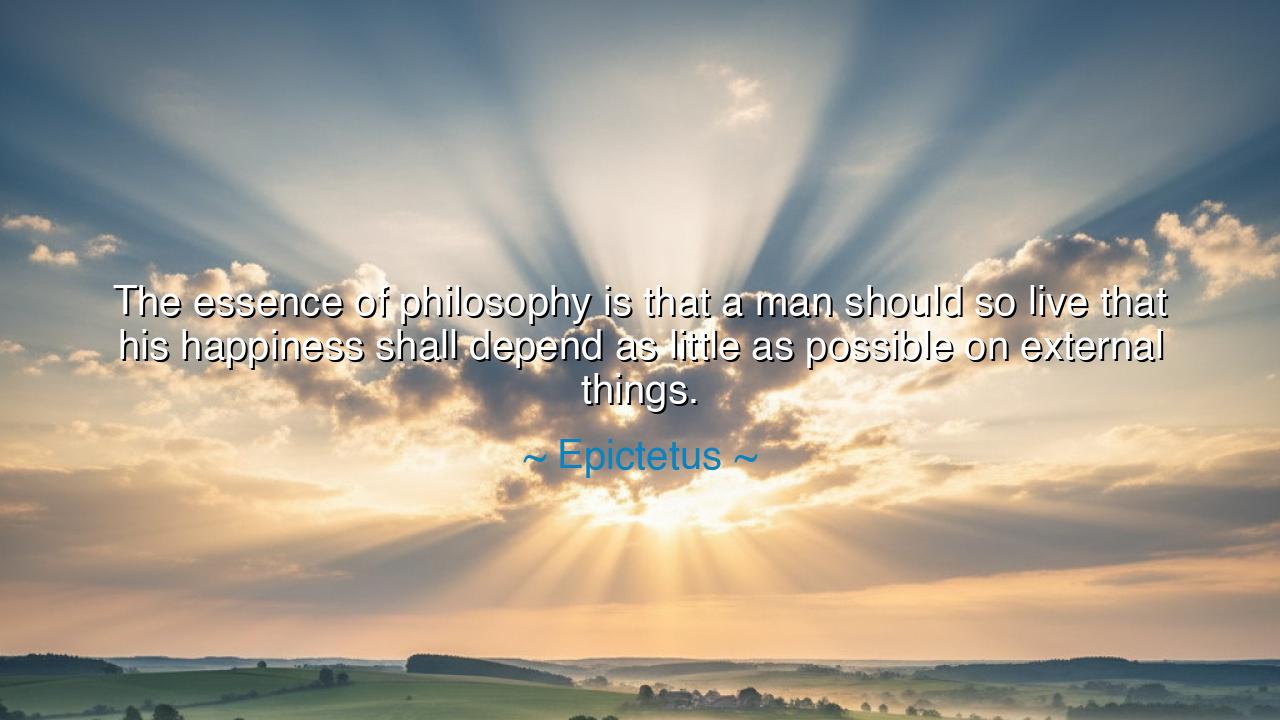
The essence of philosophy is that a man should so live that his
The essence of philosophy is that a man should so live that his happiness shall depend as little as possible on external things.






The Stoic sage Epictetus, born a slave yet freer than most kings, once uttered these immortal words: “The essence of philosophy is that a man should so live that his happiness shall depend as little as possible on external things.” In this single thought lies the foundation of all inner liberty. He speaks not to scholars alone, but to every soul that has suffered from the fickle tides of fate. What he means is this: true happiness does not come from wealth, from comfort, or from the praise of men. It arises from within—from the mastery of oneself, from the calm dominion of reason over desire, and from the serenity that cannot be stolen by loss or misfortune.
To understand the meaning of this teaching, one must see life as Epictetus saw it. Born into slavery in the Roman Empire, he possessed nothing—no home, no property, not even freedom over his own body. Yet he discovered that within the prison of flesh there was a realm untouchable by masters: the realm of the mind. There, no whip could reach, no chain could bind. It was in this realization that the Stoic doctrine took root: that virtue, not circumstance, is the measure of happiness. Thus, Epictetus taught that a man should not strive to rule the world, but to rule himself.
Think of Socrates, standing before his accusers, condemned to death for teaching truth. Around him were the walls of the Athenian court, the jeers of the powerful, and the fear of approaching death. Yet he drank the hemlock as calmly as one might sip from a cup of wine. Why? Because his peace did not depend on external things—not on the opinions of men, nor the continuance of life, nor the mercy of the state. His happiness was born of integrity, of knowing that he lived in harmony with his principles. Thus he died free, though the chains of the city lay upon him.
This wisdom has echoed through centuries. In the dark prisons of history, in the lonely nights of exile, and in the silence of loss, those who understood this truth stood unbroken. Nelson Mandela, confined for twenty-seven years, was stripped of everything—freedom, family, nation. Yet within that narrow cell he found a deeper strength. “I am the master of my fate,” he wrote, echoing Epictetus across the ages. His joy did not depend on sunlight or comfort, but on the quiet fire of inner freedom. When he emerged, he did not seek vengeance, but peace. That is the power of a soul untethered from the world’s illusions.
The origin of this quote, then, lies in the heart of Stoic philosophy—a path not of cold indifference, but of noble courage. The Stoics did not reject the world; they transcended it. They saw that to depend upon fortune for happiness is to live as a beggar of chance. The world changes—wealth fades, love dies, youth passes, nations fall—but the man who builds his peace upon reason, virtue, and acceptance stands unmoved. Like a lighthouse in the storm, he guides others even as waves crash upon his base.
Yet let no one mistake this teaching as a call to isolation. To live without dependence does not mean to live without love or compassion. It means to love without clinging, to act without demanding reward, to serve without expecting praise. The Stoic does not withdraw from life; he walks through it as a master, not a slave. He takes joy in the sunrise but does not mourn when night falls, for he knows that both light and darkness serve the same eternal order.
So, what lesson shall we draw from this ancient flame of wisdom? That every man and woman must labor to build within themselves a fortress that no power can breach. Begin with self-discipline: govern your thoughts, your desires, your fears. Practice gratitude for what you have, yet prepare calmly to lose it. When insulted, remember that your peace belongs to you, not to the one who seeks to disturb it. When fortune smiles, receive her gifts with grace, but hold them lightly, for they are but guests in your house, not its foundation.
Thus, live as Epictetus taught—not as one who depends upon the uncertain, but as one who draws strength from the eternal. Let your happiness spring from wisdom, not wealth; from character, not circumstance; from truth, not the fleeting approval of others. For the man whose joy is rooted in the self is like a mountain that stands unmoved by wind or rain. His serenity is his kingdom, and his crown is peace. And when the world trembles, he remains—calm, radiant, unbroken—because he has learned the secret of all philosophy: that the only true freedom is the mastery of one’s own soul.






AAdministratorAdministrator
Welcome, honored guests. Please leave a comment, we will respond soon